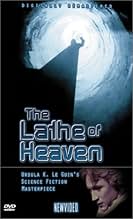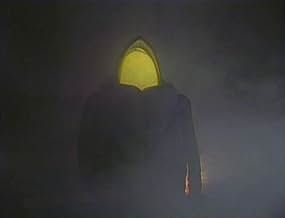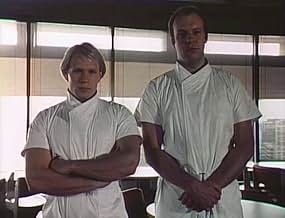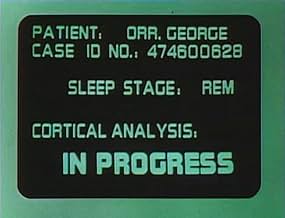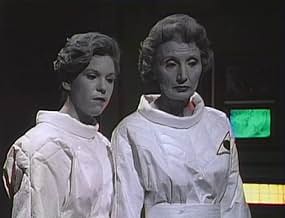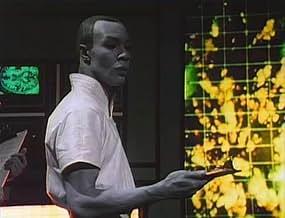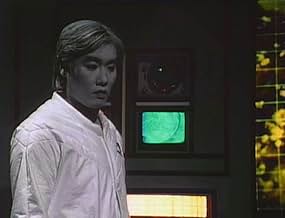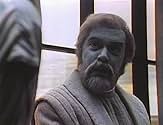The Lathe of Heaven
- Téléfilm
- 1980
- 1h 45min
NOTE IMDb
7,1/10
2,9 k
MA NOTE
Ajouter une intrigue dans votre langueIn a highly controlled and overpopulated society, a man who has terrifying dreams that affect reality is assigned a psychiatrist who takes advantage of the situation.In a highly controlled and overpopulated society, a man who has terrifying dreams that affect reality is assigned a psychiatrist who takes advantage of the situation.In a highly controlled and overpopulated society, a man who has terrifying dreams that affect reality is assigned a psychiatrist who takes advantage of the situation.
- Réalisation
- Scénario
- Casting principal
- Récompenses
- 1 nomination au total
Peyton E. Park
- Mannie Ahrens
- (as Peyton Park)
James Bodean
- Guard
- (non crédité)
John Rainone
- The Grey Person
- (non crédité)
Ben Stephenson
- Scientist
- (non crédité)
Avis à la une
As the die-hard science fiction fans know, special effects are great, but without a great story, it won't stand the test of time.
Based on Ursula K. Leguin's book, this is (I hear) a very faithful adaptation. And easily one of the very best made for t.v. movies ever.
The effects are low budget, but that's not important, the story is amazing. Great science fiction takes us away from the familiar structure of life we understand, and stands reason and convention on it's head. It makes us see the things that are so close to us they are invisible. Great science fiction frames the familiar, in a new context and sheds truth on things we were unable to recognize in their mundane form.
This story moved me, in the way the book Stranger in a Strange Land did. Like the first time I read 2001 (The movie is meaningless without the book).
It is a story about reality, how we perceive it, how we shape it. How we are important to everyone and every thing, as our actions shape not only our own sphere of existence, but ripple outward effecting everything. This is of course told in an abstracted way, but the message is clear.
If you are looking for crazy robots and sleek starships, move on.
If you are looking for a thought provoking story, that will stick with you for days, or as I see with myself and others here, decades, then this is a cult classic that you simply can not miss.
I would have given it a 10, but the effects are low budget, though that does not make it any less amazing.
Based on Ursula K. Leguin's book, this is (I hear) a very faithful adaptation. And easily one of the very best made for t.v. movies ever.
The effects are low budget, but that's not important, the story is amazing. Great science fiction takes us away from the familiar structure of life we understand, and stands reason and convention on it's head. It makes us see the things that are so close to us they are invisible. Great science fiction frames the familiar, in a new context and sheds truth on things we were unable to recognize in their mundane form.
This story moved me, in the way the book Stranger in a Strange Land did. Like the first time I read 2001 (The movie is meaningless without the book).
It is a story about reality, how we perceive it, how we shape it. How we are important to everyone and every thing, as our actions shape not only our own sphere of existence, but ripple outward effecting everything. This is of course told in an abstracted way, but the message is clear.
If you are looking for crazy robots and sleek starships, move on.
If you are looking for a thought provoking story, that will stick with you for days, or as I see with myself and others here, decades, then this is a cult classic that you simply can not miss.
I would have given it a 10, but the effects are low budget, though that does not make it any less amazing.
Last night I got a chance to see one of my favorite SF movies, and it only took 20 years.
Back in 1978, I was working at a mom-and-pop bookstore in Dallas called Taylors. One day one of the customers bought a book by Ursula K. LeGuin: "The Lathe of Heaven". I told her that she was one of my favorite authors, and that I loved the book. She said that she was involved in the production of a film of the book that was to be done locally.
Early in 1980 it was aired. Bruce Davison (recently the Senator in "X-men") played the protagonist, George Orr. And various Metroplex locations stood in for Portland in the near-future year of 2002. City Hall (later the OCP HQ in "Robocop"), Reunion Arena and the Water Gardens in FW (previously used in "Logan's Run").
George Orr has a problem: dreams. He doesn't want to have any. He takes drugs to try and thwart his unconscious so that he can sleep but not dream. Because if he does dream a special kind of dream, an "effective" dream, it changes reality "all the way back to the Stone Age".
Dr. William Haber is an oneirologist: a dream specialist. He doesn't believe George's story, of course. He thinks that George is sick, not cursed. He eventually comes around to the realization that George is right. A power struggle ensues to decide who will be in charge of deciding who gets to make the decisions of how to use this power.
The story touches on race relations, psychology, Taoism and more. And all on a miniscule budget of 250K.
An added bonus was the addition of interviews with Bruce Davison and Ms. LeGuin, the latter with Bill Moyers. She rarely does interviews, and it was wonderful hearing her add little behind-the-scenes details and commenting on the story and film. Since my understanding of Taoism is limited to readings of "The Tao of Pooh", I didn't realize the use of Taoism until I heard UKL mention it.
If I had had 90 bucks to blow on a KERA membership, I could have gotten the video from them. In fact, the on-air weasel said that the tape was "only available through public TV". If you check amazon.com, as I did last night, you will find that this is a bald-faced lie: TLoH will be released on VHS and DVD later this month, with the interviews and all.
The only thing that burned my butt about the film that I saw last night was the one change they made. Originally, they used Ringo Starr's version of the Beatles tune "A Little Help from My Friends". The new version has a different cover version. One of the reviews on amazon.com stated that this was because it would cost too much to get the rights from Michael Jackson, who now owns the entire Beatle catalog. This doesn't work. IMHO, MJ would get money no matter who did it.
Uncle Steve says check it out.
Back in 1978, I was working at a mom-and-pop bookstore in Dallas called Taylors. One day one of the customers bought a book by Ursula K. LeGuin: "The Lathe of Heaven". I told her that she was one of my favorite authors, and that I loved the book. She said that she was involved in the production of a film of the book that was to be done locally.
Early in 1980 it was aired. Bruce Davison (recently the Senator in "X-men") played the protagonist, George Orr. And various Metroplex locations stood in for Portland in the near-future year of 2002. City Hall (later the OCP HQ in "Robocop"), Reunion Arena and the Water Gardens in FW (previously used in "Logan's Run").
George Orr has a problem: dreams. He doesn't want to have any. He takes drugs to try and thwart his unconscious so that he can sleep but not dream. Because if he does dream a special kind of dream, an "effective" dream, it changes reality "all the way back to the Stone Age".
Dr. William Haber is an oneirologist: a dream specialist. He doesn't believe George's story, of course. He thinks that George is sick, not cursed. He eventually comes around to the realization that George is right. A power struggle ensues to decide who will be in charge of deciding who gets to make the decisions of how to use this power.
The story touches on race relations, psychology, Taoism and more. And all on a miniscule budget of 250K.
An added bonus was the addition of interviews with Bruce Davison and Ms. LeGuin, the latter with Bill Moyers. She rarely does interviews, and it was wonderful hearing her add little behind-the-scenes details and commenting on the story and film. Since my understanding of Taoism is limited to readings of "The Tao of Pooh", I didn't realize the use of Taoism until I heard UKL mention it.
If I had had 90 bucks to blow on a KERA membership, I could have gotten the video from them. In fact, the on-air weasel said that the tape was "only available through public TV". If you check amazon.com, as I did last night, you will find that this is a bald-faced lie: TLoH will be released on VHS and DVD later this month, with the interviews and all.
The only thing that burned my butt about the film that I saw last night was the one change they made. Originally, they used Ringo Starr's version of the Beatles tune "A Little Help from My Friends". The new version has a different cover version. One of the reviews on amazon.com stated that this was because it would cost too much to get the rights from Michael Jackson, who now owns the entire Beatle catalog. This doesn't work. IMHO, MJ would get money no matter who did it.
Uncle Steve says check it out.
The Lathe of Heaven has just been re-released. It's being shown on many PBS stations, and is also now on video. This was all due to high fan demand.
This is a dreamy, scary sci-fi flick with strong moral lessons. It's almost like a play: set mostly in one place, with only three characters involved. The special effects aren't stunning, but they're perfectly effective. The story is wildly original: what would the world be like if your dreams all came true- not your daydreams, but the uncontrollable ones at night?
This is a dreamy, scary sci-fi flick with strong moral lessons. It's almost like a play: set mostly in one place, with only three characters involved. The special effects aren't stunning, but they're perfectly effective. The story is wildly original: what would the world be like if your dreams all came true- not your daydreams, but the uncontrollable ones at night?
I find it hard to believe that a film this popular is out of reach. This was one of the few films that leaves the viewer rethinking one's philosophy about the future, the past, the present, and human kind!! Did I dream it? Is there some strange power that prevents us from sharing it with others? Was it meant to be seen by a few chosen people who let it into their collective souls and minds? I'm not crazy! What if the Augmenter is at work here? Dream well tonight..under the other moons light..remember the lessons..reserved for our sight..it may be forever..or later tonight..that this films message..finally takes flight. Everyone who mentions this film feels changed at least a little by it. Lets find out if its meant to be seen again. We must stop the Augmenter and change the future. Lets see it again!! Ha! Dream on!!
I had public television on several days ago (March 10, 2001) and "Lathe of Heaven" was starting on their series "Movies Worth Taping". I'm glad I happened to turn the TV on, as it was a movie well worth watching! It was made in 1987 as the first made-for-public-TV film, and is based on a novel by Ursula Le Guin.
This movie explores the notion of "effective dreaming", where one's dreams actually come true. It explores the strange dreams of George Orr (Bruce Davison). When he has these dreams, he wakes to find that his dreamt-up situations are now not only reality, but other people suddenly have adapted as if this reality has been with the world for some time.
George is traumatized by these dreams, and seeks the help of Dr. William Haber (Kevin Conway). Dr. Haber's intentions are good, to harness the power of these effective dreams to the betterment of the world, but he clearly abuses the doctor-patient relationship and hypnotizes George to have specific kinds of dreams. One motto of this film might be "be careful what you dream about"!
I found the special effects sometimes interesting, but often heavy-handed and not so smoothly executed. The setting, sometime in the near future in Portland, Oregon, was inexplicably dreary, beyond the rain that the city is well known for. The character development could have been stronger, with ancillary characters like Dr. Haber's secretary and the very few others seeming to be made out of cardboard and lacking emotion. George and Heather LeLache (Margaret Avery), however, enjoyed more solid and believable depictions.
In spite of these criticisms, the film was an exciting journey into inner space that indulges us to think about deep philosophical questions. What is reality? Are there parallel realities? What is or should be knowable about the nature of existence (to me reminiscent a bit of "2010", one of my favorite science fiction films)? What happens if we dream each other into or out of reality? "The greatest good for the greatest number" or rights of the individual? Can we design a utopia or will we be doomed to experience accidents we never considered that render such a proposed utopia much less than ideal? "The Lathe of Heaven" doesn't have the fresh and exciting visual effects of earlier science fiction films like "2001" or later ones, but is an interesting film that is a must see for science fiction fans.
This movie explores the notion of "effective dreaming", where one's dreams actually come true. It explores the strange dreams of George Orr (Bruce Davison). When he has these dreams, he wakes to find that his dreamt-up situations are now not only reality, but other people suddenly have adapted as if this reality has been with the world for some time.
George is traumatized by these dreams, and seeks the help of Dr. William Haber (Kevin Conway). Dr. Haber's intentions are good, to harness the power of these effective dreams to the betterment of the world, but he clearly abuses the doctor-patient relationship and hypnotizes George to have specific kinds of dreams. One motto of this film might be "be careful what you dream about"!
I found the special effects sometimes interesting, but often heavy-handed and not so smoothly executed. The setting, sometime in the near future in Portland, Oregon, was inexplicably dreary, beyond the rain that the city is well known for. The character development could have been stronger, with ancillary characters like Dr. Haber's secretary and the very few others seeming to be made out of cardboard and lacking emotion. George and Heather LeLache (Margaret Avery), however, enjoyed more solid and believable depictions.
In spite of these criticisms, the film was an exciting journey into inner space that indulges us to think about deep philosophical questions. What is reality? Are there parallel realities? What is or should be knowable about the nature of existence (to me reminiscent a bit of "2010", one of my favorite science fiction films)? What happens if we dream each other into or out of reality? "The greatest good for the greatest number" or rights of the individual? Can we design a utopia or will we be doomed to experience accidents we never considered that render such a proposed utopia much less than ideal? "The Lathe of Heaven" doesn't have the fresh and exciting visual effects of earlier science fiction films like "2001" or later ones, but is an interesting film that is a must see for science fiction fans.
Le saviez-vous
- AnecdotesThe night that this was first broadcast, there was a major power outage in the Pacific Northwest, which meant that author Ursula K. Le Guin was unable to watch the film based on her own book on its first run.
- GaffesOn the government water distribution tanker truck, the word "mobile" is misspelled "MOBIL". Although, since this takes place in the future, it's possible the spelling has changed.
- ConnexionsFeatured in No Sleep TV3: Classic Episode #1: "Our All-Time Faves" (2015)
Meilleurs choix
Connectez-vous pour évaluer et suivre la liste de favoris afin de recevoir des recommandations personnalisées
Détails
- Date de sortie
- Pays d’origine
- Site officiel
- Langue
- Aussi connu sous le nom de
- La rueda celeste
- Lieux de tournage
- Sociétés de production
- Voir plus de crédits d'entreprise sur IMDbPro
Contribuer à cette page
Suggérer une modification ou ajouter du contenu manquant

